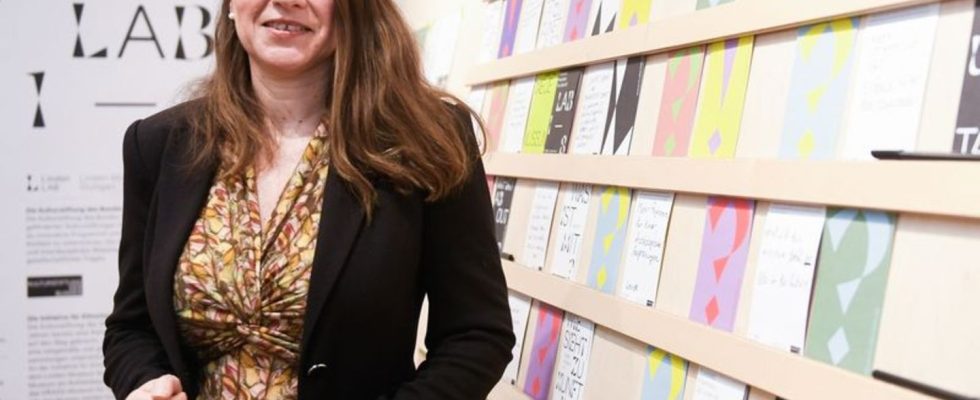Colonial history
Museums want to organize returns
Inés de Castro, director of the Linden Museum in Stuttgart, would like to see museums take a pan-German approach to dealing with looted items. photo
© Tom Weller/dpa
Tens of thousands of them are a reminder of dark chapters in European colonial history: there are often looted remains of other cultures in museums. Museums and countries now want to address the debate about returning masks or jewelry to Cameroon together.
More than 40,000 objects from the former German colony are stored in German museums Cameroon, a very large number of which were stolen during the colonial period and ended up in collections. After decades of hesitation, pieces of looted property from other regions are now gradually being returned. The famous Benin bronzes from what is now Nigeria have recently made headlines, and human remains from other cultures have also been transferred.
Now eleven German museums of world cultures and the federal states want to put the topic of possible restitution and cooperation on a broader basis and start a dialogue with Cameroon. After an initial meeting with delegations and representatives of traditional royal families from Cameroon in Stuttgart, the houses hope for a personal exchange and growing trust.
What do the museums want to achieve?
The aim is for museums to take a pan-German approach, said the director of the Linden Museum in Stuttgart, Inés de Castro, on Monday on the sidelines of the meeting. “We want to look for ways of restitution and sustainable cooperation with Cameroon.” In addition, the communities of origin should be able to have an important say in the debate. From the perspective of the Baden-Württemberg Science Minister Petra Olschowski (Greens), it must also be clarified to whom and when returns can take place and who should be included. The Stuttgart collection houses the largest Cameroonian collection in Germany with around 8,000 objects.
And what awaits the delegation from Cameroon?
At the meeting in Stuttgart, head of delegation Rékia Nnunfu Ngeh emphasized that the state of Cameroon must play the central role in the process of returning cultural assets. The Africans also want to play a decisive role in the roadmap. Anna Bartels from the Foreign Office has already agreed to this. “The pace of the return process is set by Cameroon, not Germany,” she said.
Why do the traditional royal families also take part in the dialogue?
Representatives of many traditional groups also claim ownership rights for themselves. For many indigenous peoples, the relationship with their ancestors has a completely different cultural and religious meaning than it does for us. “Every single one of these objects is part of the soul of our people,” said Bruno Mvondo, representative of the Fang Bèti clan from Cameroon, in Stuttgart.
What do the German museums demand from Cameroon?
Actually nothing, those responsible at the museums and countries emphasize again and again. The restitution is not subject to any conditions, said museum director de Castro. “We don’t just lose, even if it hurts to give something away. We also benefit. We gain a lot through the exchange.” At the meeting in Stuttgart, De Castro and other experts also expressed the hope that many objects could remain in German collections, for example as permanent loans, in exhibitions or through agreements with rightful owners. However, the federal and state governments have the final say in the debate about returns.
The range is wide. There are vases and sculptures, masks and religious symbols, weapons and jewelry. The particularly sensitive handling of human bones and skeletons, which often came to Germany as spoils of war or from grave looting, does not play a role in the Cameroon dialogue.
What role did Cameroon play in German history?
Cameroon was a German colony from 1884 to 1919. During this time, objects such as musical instruments, textiles, weapons, jewelry, architectural elements, everyday objects, ritual statues and masks were brought to the German Empire. Various traditional communities in Cameroon are demanding the return of their cultural assets and have started discussions with individual museums.
Have there already been returns?
Yes, individual items from German collections were returned from time to time. The return of valuable Benin bronzes and other cultural assets from German museums to Nigeria caused a stir at the end of 2022. The objects, which are made of bronze as well as ivory and other materials, mostly come from British looting in 1897. They were also returned to a New Zealand Maori delegation and representatives from Hawaii, among others.
Why are there repatriations?
They are part of the larger context of returns of colonial-era museum pieces. Museums want to make their contribution to reparations by coming to terms with the colonial legacy. The pieces were acquired in former European colonies, whose framework conditions were characterized by the imbalance of control and power between the colonial power and the locals. “We have ignored our colonial legacy for too long,” said Science Minister Olschowski. Germany is ready to return further objects.

